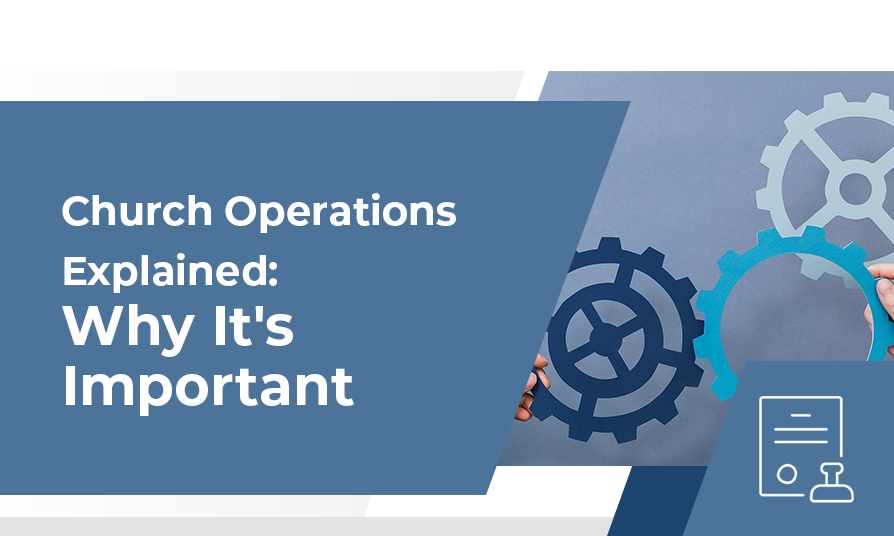When we think of ministry, we tend to visualize a pastor preaching a sermon…not church operations tasks. We don’t often think of the behind-the-scenes work such as:
- Ensuring the air conditioning is functional
- Keeping the children’s check-in system up and running
- Confirming that all church bills are paid
Those are a few examples of the tasks involved in making front-line ministry efforts happen. So, what does church operations truly entail?
Here are Several Examples of Church Operations Activities:
#1 – Finances
To ensure excellent stewardship of church finances, someone has to oversee the financial records and associated policies and procedures. This includes:
- Establishing a proper process for counting and recording offerings
- Tracking departmental budgets
- Maintaining good accounting controls
- Providing insight into the financial status of the church
#2 – Human Resources
Most churches have at least a few staff members. When you have employees, you’ll need to establish and enforce HR policies, facilitate payroll, handle hiring and firing processes, and more.
#3 – Insurance
There are several types of insurance a church may need at any given time. This may include:
- Employee health insurance
- Church liability insurance
- Vehicle insurance
- Property insurance
- Special event insurance
#4 – Information Technology
Given how much we depend on technology these days, churches need someone to oversee the procurement, installation, and maintenance of that tech. This may include:
- Computers
- Hardware
- Software and software subscriptions
- Email systems
- Any internal networks
- Church website
#5 – Church Management Software
Church Management Software (ChMS) can be an incredible tool for keeping excellent donor records, tracking discipleship program progress, coordinating small groups, and much more. However, it requires someone to ensure the software selected works well for the church and that everyone uses it appropriately.
#6 – Facility Management
Many churches have a designated Facilities Manager to maintain facilities, coordinate room set up for various services and events, oversee any repairs or building projects, and more.
#7 – Project Management
Many churches do not have a standard project management process. However, every church has projects of some sort. Building remodels, ministry outreach events, and efforts to refresh policies and procedures, are all examples of potential projects. A church that has a standard process for leading all projects will be more effective and efficient (read: save time and money).
#8 – Security
Unfortunately, bad guys don’t consider churches off-limits. As a result, churches have to consider how to secure their facilities, valuables, and people. This may include emergency response planning, dealing with the impact of a natural disaster (or pandemic), locks, safes, and security cameras.
#9 – Volunteer Management
Finally, a church needs a dedicated team of volunteers to grow and thrive. The process of inviting people to serve, assigning them to a volunteer role, providing training, and expressing appreciation must be consistent and well-established.
With so much falling under “Church Operations,” it’s challenging for any one person to effectively oversee such a wide variety of responsibilities. However, that’s what many churches expect their Executive Pastor, Operations Director, or Church Business Administrator to do.
In an effort to support those with this dizzying array of tasks, The Church Operations Toolkit includes templates, resources, and subject matter expert interviews in each of these categories. If you’ve been tasked with managing some or all of these areas, The Church Operations Toolkit is an excellent resource to save you time, money, and headaches along the way.



